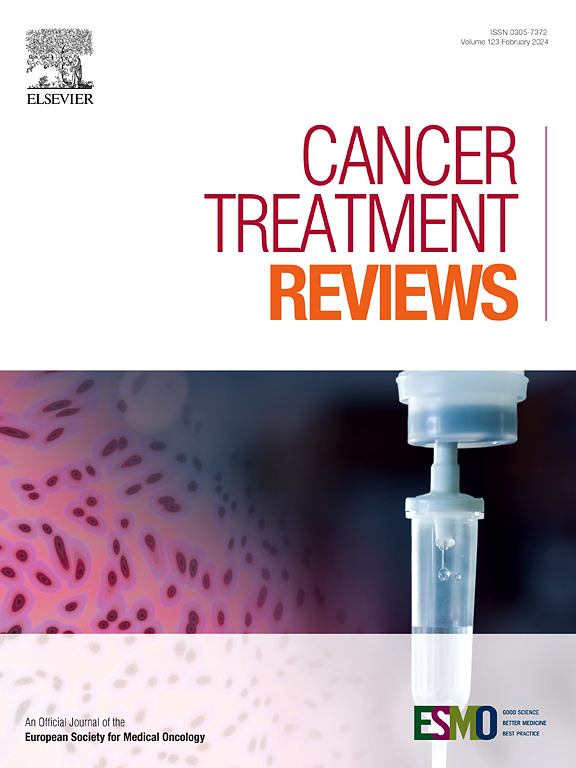2025年如何治疗dMMR/MSI胃食管腺癌?EORTC-GITCG胃食管特别工作组的意见书
IF 9.6
1区 医学
Q1 ONCOLOGY
引用次数: 0
摘要
在不到十年的时间里,免疫检查点抑制剂(ICIs)已经改变了错配修复缺陷(dMMR)和微卫星不稳定性高(MSI)癌症的管理。然而,除结直肠癌(CRC)外,大部分证据主要来自非随机II期研究或更广泛的临床试验的事后分析。dMMR/MSI肿瘤代表了胃食管腺癌(GEA)的一个特定亚组,约占病例的9%,与晚期疾病和老年女性患者相比,早期发病率更高。这些肿瘤主要是散发性的,通常与MLH1启动子甲基化有关,很少表现出HER2过表达/ERBB2扩增或其他致癌驱动因素。早期dMMR/MSI GEA的治疗前景可能很快就会发生实质性变化,因为ICIs在小型II期试验中显示出高病理完全缓解(pCR)率,这提出了优化新辅助治疗的问题,并为器官保存铺平了道路。未经治疗的晚期dMMR/MSI GEA患者的治疗标准是化疗+ ICI,无论PDL-1状态如何。然而,由CTLA-4 + PD-1抑制剂组成的无化疗方案的作用仍未确定。本综述解决了这些和其他新出现的问题,为dMMR/MSI GEA的未来治疗前景提供了专家意见和见解。本文章由计算机程序翻译,如有差异,请以英文原文为准。

How do I treat dMMR/MSI gastro-oesophageal adenocarcinoma in 2025? A position paper from the EORTC-GITCG gastro-esophageal task force
In less than a decade, immune checkpoint inhibitors (ICIs) have transformed the management of mismatch repair-deficient (dMMR) and microsatellite instability-high (MSI) cancers. However, beyond colorectal cancer (CRC), much of the evidence is mostly derived from non-randomized phase II studies or post-hoc analyses of broader clinical trials. dMMR/MSI tumours represent a specific subgroup of gastro-esophageal adenocarcinomas (GEA), accounting for approximately 9 % of cases, with a higher prevalence in early-stage compared to advanced-stage disease and older female patients. These tumours are predominantly sporadic, often linked to MLH1 promoter methylation, and rarely exhibit HER2 overexpression/ERBB2 amplification or other oncogenic drivers. The treatment landscape for early stage dMMR/MSI GEA is likely to change substantially soon, as ICIs have shown high pathological complete response (pCR) rates in small phase II trials, raising questions on optimisation of neoadjuvant therapy, and paving the way for organ preservation. The standard of treatment for untreated patients with advanced dMMR/MSI GEA is chemotherapy + ICI irrespectively of PDL-1 status. However, the role of chemotherapy-free regimen consisting of CTLA-4 plus PD-1 inhibitors remains undetermined. This review addresses these and other emerging questions, offering expert opinions and insights into the future therapeutic landscape for dMMR/MSI GEA.
求助全文
通过发布文献求助,成功后即可免费获取论文全文。
去求助
来源期刊

Cancer treatment reviews
医学-肿瘤学
CiteScore
21.40
自引率
0.80%
发文量
109
审稿时长
13 days
期刊介绍:
Cancer Treatment Reviews
Journal Overview:
International journal focused on developments in cancer treatment research
Publishes state-of-the-art, authoritative reviews to keep clinicians and researchers informed
Regular Sections in Each Issue:
Comments on Controversy
Tumor Reviews
Anti-tumor Treatments
New Drugs
Complications of Treatment
General and Supportive Care
Laboratory/Clinic Interface
Submission and Editorial System:
Online submission and editorial system for Cancer Treatment Reviews
 求助内容:
求助内容: 应助结果提醒方式:
应助结果提醒方式:


